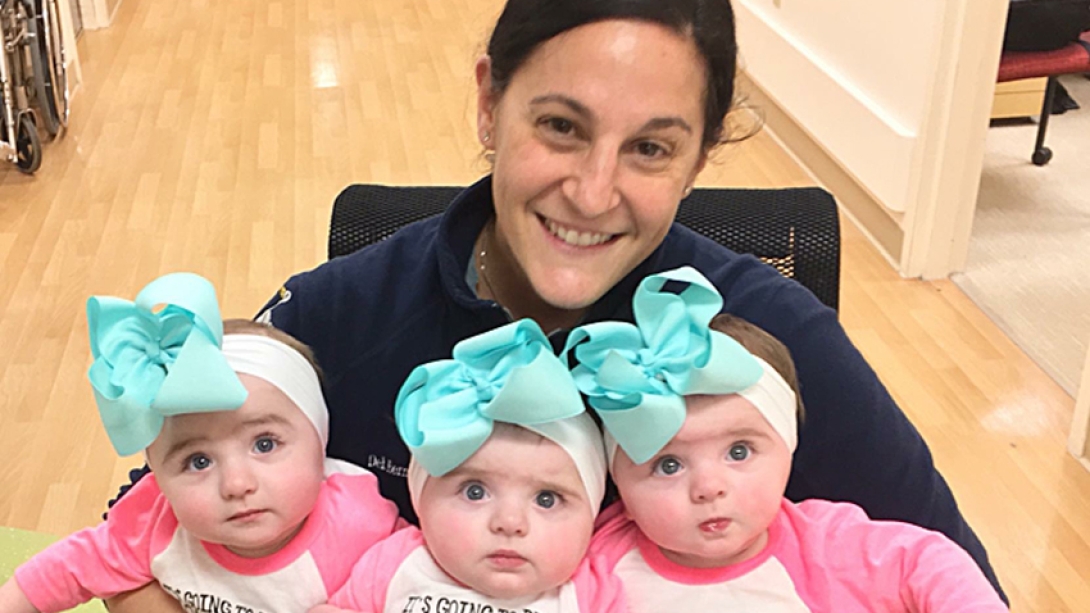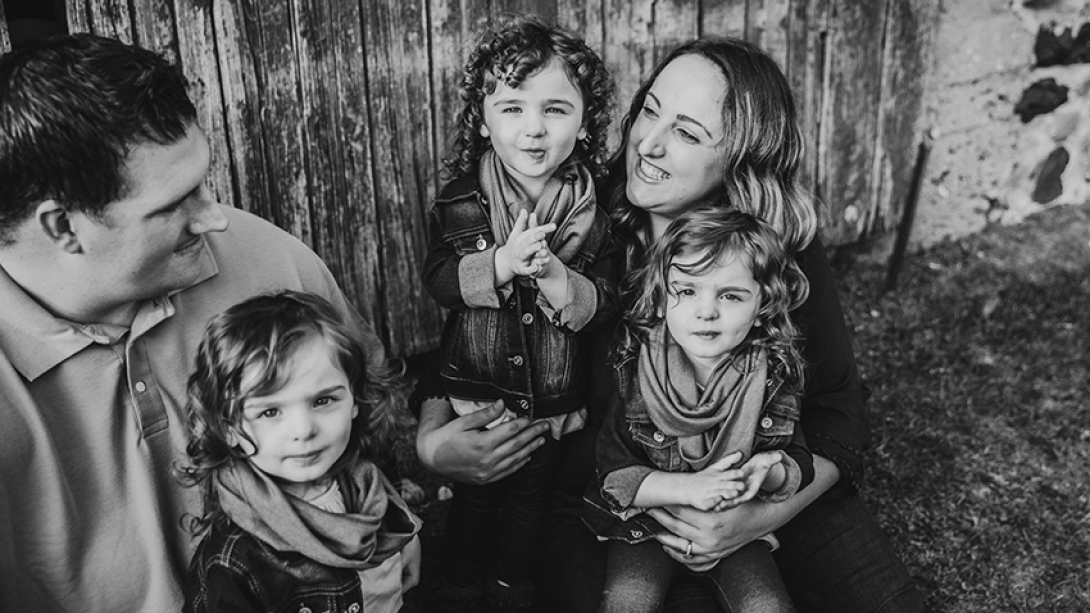Personalized care helped a mother and her three children overcome pregnancy complications and other hurdles. Today, the siblings are enjoying life and each other.
7:00 AM
Author |

Rosalie, Josephine and Eleanor Buursma often spend their days watching Disney's Frozen, singing and dancing in circles together and trying on new shoes and bows.
LISTEN UP: Add the new Michigan Medicine News Break to your Alexa-enabled device, or subscribe to our daily audio updates on iTunes, Google Play and Stitcher.
The blue-eyed triplets have also become local social media stars for their modeling of boutique baby clothes. Photos of the 2-year-olds in matching, bright-colored outfits and accessories are frequently shared on Instagram.
But the toddlers' journey has been full of uncertainties — from their mother's high-risk pregnancy and being born three months early to an ICU stay on their first birthday.
"Every day we are just so thankful for them," says their mother, Victoria Buursma.

A high-risk birth
For the first few weeks of Victoria's pregnancy, she and her husband, Kody, thought they were having twins.
An ultrasound proved differently: Another baby girl was also on the way.
"My dad is a triplet," Victoria says. "But we couldn't believe it. We were thrilled."
MORE FROM MICHIGAN: Sign up for our weekly newsletter
The Buursmas were referred to the maternal-fetal medicine team at University of Michigan Von Voigtlander Women's Hospital, which specializes in high-risk pregnancies, including multiples of three or more fetuses.
Doctors there carefully evaluated the triplets. They discovered the identical twins, Rosie and Josie, shared a placenta with abnormal umbilical cord flow that prevented healthy growth in the womb.
At 21 weeks, Victoria had to have weekly ultrasound evaluations and appointments with a Michigan Medicine team led by maternal-fetal medicine specialist Deborah Berman, M.D.
The close monitoring proved crucial, with Victoria's care team intervening to stop preterm labor and manage a blood pressure spike that occurred at 26 weeks.
"Our goal was to make it to 28 weeks because after that milestone, the risk of developmental delays decreases," says Victoria, who praised Berman's care and approach. "She was very upfront with the risks involved, which I appreciated. I trusted her with everything."
Born in March 2016, the three sisters made it just past 28 weeks: Josephine "Josie" at 2 pounds, 8 ounces; Rosalie "Rosie" at 2 pounds, 11 ounces; and Eleanor "Ellie" at 3 pounds, 11 ounces.
At Victoria's request, Disney music was played in the birthing room during her Caesarean section. "Circle of Life" from The Lion King was playing at the moment of their delivery.
"It's a moment we will always remember," Victoria says. "We were all laughing when the song came on — and then they all came out breathing on their own and crying. We were just so happy to finally meet them."
The girls were transferred to the Newborn Intensive Care Unit at U-M's C.S. Mott Children's Hospital. They stayed for about two months, learning to eat and continuing to grow until they could go home with their parents. The family recently moved to Gaylord, Michigan, to be closer to relatives.
Back in the hospital
When they were about 6 months old, Josie and Rosie returned to U-M to receive helmet therapy for a condition called plagiocephaly, a flattening of the head.
Both sisters spent nearly 24 hours a day for about two months wearing pink and purple helmets printed with their names. Thanks to the orthotics team's bivalve design, the Michigan Medicine-invented therapy allows adjustable helmets to grow with babies' heads and has a 95 percent success rate at correcting plagiocephaly.
SEE ALSO: 'Mr. 1 Percent' Celebrates His Fifth Birthday
But just before their first birthday, all three sisters ended up back at Mott with the flu. Rosie and Josie were in and out of the ICU, where Josie went into respiratory failure, relying on a ventilator.
"Coming back was really hard on us," Victoria says. "You finally think you've made it out of the first year after so many risks only to wind up back at the hospital with something so serious."
Here's a family who experienced incredible uncertainty and stress and is now finally able to just enjoy being parents to active, healthy toddlers.Deborah Berman, M.D.
The triplets' 1½-week hospital stay kept them there on their first birthday.
"The NICU nurses who took care of them when they were born made a birthday sign for them and brought presents. It showed how much they cared," Victoria says. "It was a terrible time, but it made a big difference to have this kind of support.
"These were people who cared for my babies when it was most critical, and that will always be a special relationship. They're like family."
Fortunately, their next birthday was a much better celebration. The family threw a big "twotii frutti"-themed party because of how much the girls enjoy fruit.
"It's amazing to experience all of these moments with them," Victoria says. "People assume having triplets is chaotic, but actually it's pretty fun. They are all on the same schedule and always have someone to play with.
"I can't imagine my life any other way."

Keeping in touch
Periodically, the girls and their parents stop by Von Voigtlander to visit the doctor and care teams who were with them from the beginning.
"My whole family just developed such a strong relationship with Dr. Berman," Victoria says. "We still send her pictures and updates. She was so easy to trust, and you can see how much she really cares about her patients. She's always so happy to see us and interested in the well-being of the girls."
SEE ALSO: After 287 Days in the ICU, Little Victor Heads to Washington
Berman looks forward to the updates and visits, too.
"It's always so much fun to see them," Berman says. "Here's a family who experienced incredible uncertainty and stress and is now finally able to just enjoy being parents to active, healthy toddlers.
"I just love seeing these tiny babies we helped deliver grow up into these beautiful little girls who are full of life and so much personality. It's the outcome we always strive for."

Explore a variety of healthcare news & stories by visiting the Health Lab home page for more articles.

Department of Communication at Michigan Medicine
Want top health & research news weekly? Sign up for Health Lab’s newsletters today!





